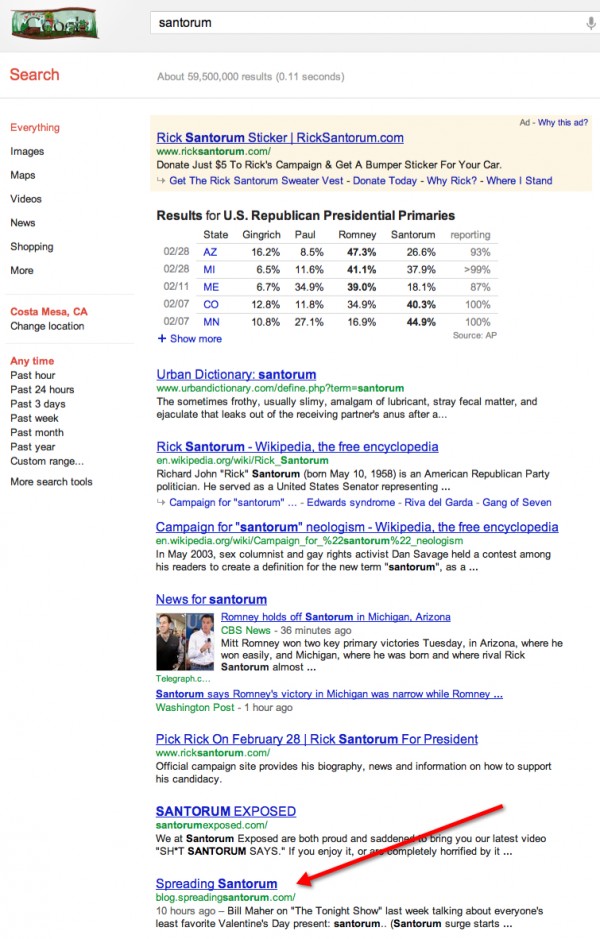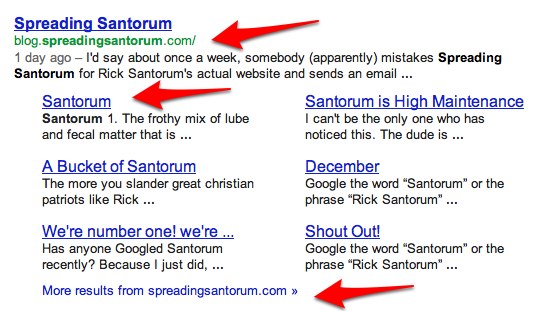“Spreading Santorum” Drops At Google; New Site Keeps Anal Sex Definition At Number One
As Republican presidential candidate Rick Santorum loses two primary races to rival Mitt Romney, perhaps he can console himself with, ironically, another loss. Spreading Santorum, the page defining “santorum” as a by-product of anal sex, has finally dropped from the top results on Google. The related anti-Santorum blog, however, remains. And a page from Urban […]
As Republican presidential candidate Rick Santorum loses two primary races to rival Mitt Romney, perhaps he can console himself with, ironically, another loss. Spreading Santorum, the page defining “santorum” as a by-product of anal sex, has finally dropped from the top results on Google. The related anti-Santorum blog, however, remains. And a page from Urban Dictionary keeps the definition alive, more explicit than before.
Santorum: The Definition Page
The page at SpreadingSantorum.com, created by columnist Dan Savage as a protest against Santorum’s views about homosexuality, has maintained its position in the top results on Google for years. The page defines “santorum” as:
The frothy mixture of lube and fecal matter that is sometimes the by-product of anal sex.
To understand more of the history of the site, and how it ended up doing so well on Google (and Bing, Yahoo and Baidu), see my previous article, Should Rick Santorum’s “Google Problem” Be Fixed?
The page was still in the top results for a search on “santorum” when I checked last week. However, Anthony Hecht alerted me this evening that the page had disappeared. Indeed, I see the same, though as I said, the related blog is now showing. I’ve had multiple other confirmations this has happened.
Before The Change
The before-and-after explains better. This is before, as of Feb. 8, the last screenshot I have handy for a search on santorum on Google:
You can see that SpreadingSantorum.com appears as the first regular listing; the official Rick Santorum site comes in at fourth. Those positions are pretty typical of what I’ve seen over the past few weeks, as I’ve written about this story.
After The Change
Here’s tonight:
In this case, the official Rick Santorum site has remained in fourth position. The SpreadingSantorum.com page has gone. It doesn’t appear in the first page of results at all. However, the Spreading Santorum blog — blog.spreadingsantorum.com — does appear in the top results, listed sixth.
The first place position Spreading Santorum had is taken over by a page at Urban Dictionary, which says:
The sometimes frothy, usually slimy, amalgam of lubricant, stray fecal matter, and ejaculate that leaks out of the receiving partner’s anus after a…
That’s a pretty odd switch. Given that Spreading Santorum originated the sex-related definition of “santorum,” its pretty odd relevancy for Google to decide that a different site offering an even more explicit definition should get top billing.
For a search on rick santorum, SpreadingSantorum.com had ranked in the first page of results, such as in fourth place, as shown here. Today, it’s moved to the second page of results. And oddly, it’s not the home page that appears but instead one of its inside pages:
Anti-Santorum, Just Less Explicit
Here’s another before-and-after, this time focusing on the how the Spreading Santorum page used to appear, complete with explicit description, and how the blog’s home page now takes its place:
What Happened?
I’d say Google’s come under greater pressure about the “santorum” definition page as Rick Santorum has advanced as a candidate. There have been any number of mainstream press reports about it, including some debate on whether Google should do anything to “fix” it.
To date, Google has refused to make any change specifically to the listing, which is pretty much in keeping with how it approaches these types of issues.
Instead, Google prefers to resolve tricky issues like these by looking for solutions that may impact a wide range listings. For example, rather than specifically fixing how President George W. Bush was “Google bombed” to rank for “miserable failure,” Google rolled out a fix to solve Google bombs in general.
“Official Page” Change?
As I’ve explained before, the situation with Santorum is not technically a Google bomb, which is why it has escaped that pre-existing fix. But the shift might have happened due to an announcement Google made yesterday, that among about 40 changes to its search engine, it rolled-out an improvement for detecting “official” pages:
We’ve made an adjustment to how we detect official pages to make more accurate identifications. The result is that many pages that were previously misidentified as official will no longer be.
Possibly, the change is seeing blog.spreadingsantorum.com as the “official” page for Spreading Santorum rather than SpreadingSantorum.com itself.
Alternatively, it could be that SpreadingSantorum.com was somehow getting an “official” designation of some type associated with it, which may in turn have lead to a a ranking boost. Without that, the page dropped, with the blog moving up.
Link Change? Panda “Thin” Content To Blame?
Two other changes might also be involved. One is this:
We often use characteristics of links to help us figure out the topic of a linked page. We have changed the way in which we evaluate links; in particular, we are turning off a method of link analysis that we used for several years. We often rearchitect or turn off parts of our scoring in order to keep our system maintainable, clean and understandable.
Google wouldn’t tell us more about what happened here (we did ask yesterday), but it could be that the links pointing at the Santorum definition page are being evaluated (like all links are) in a new way that prevent it from ranking as well.
Alternatively, there’s this:
This launch refreshes data in the Panda system, making it more accurate and more sensitive to recent changes on the web.
The Panda Update is designed to prevent “thin” content from ranking well (see our Panda Update infographic for more about this). A single page with only a short definition might have been deemed to thin and got hit by this latest Panda update, which rolled out yesterday.
Of course, the Spreading Romney site is just as “thin” as Spreading Santorum, and that hasn’t disappeared. So Panda might not be to blame.
Other Weirdness?
For the search geeks out there trying to diagnose this, consider this:
That’s what I get at the top of the results for a search on spreading santorum. The first arrow shows how blog.spreadingsantorum.com is listed, then “sitelinks” are shown below that. The second arrow is pointing at the home page of spreadingsantorum.com, which technically is a separate site from blog.spreadingsantorum.com.
This sometimes happens. For example, a search on amazon sometimes shows me Amazon’s affiliate site as a sitelink for Amazon.com, even though the affiliate site its own domain.
But look at the third arrow. Even though blog.spreadingsantorum.com is listed as the main link, the “More results” link wants to bring back matches for spreadingsantorum.com overall. It’s strange and suggests there’s some confusion going on.
By the way, I heard back from Savage soon after posting this story. He’s made no changes to the site that he’s aware of that would have caused this, he told me.
Stay Tuned
I’m checking with Google for any explanation they have. Stay tuned for more. Meanwhile, the definition continues to rank tops in searches for “santorum” on Bing, Yahoo and even Baidu.
NOTE: The original headline for this story of “Santorum: No Longer A By-Product Of Anal Sex, According To Google” was changed because, as now noted, the Urban Dictionary listing is still keeping that definition up there.
Google Responds: It’s SafeSearch To Blame
Postscript (10:30 AM ET): Google has sent this statement:
We make more than 500 changes to our algorithms in a typical year, and with each of those changes sites will shuffle to different positions in our search results. We have not manually taken action to change the ranking of the site.
Postscript 2 (12:45 PM ET): Google tells me this is related to its improved SafeSearch algorithm, one of the other changes that was just announced. There’s no explanation yet about about why Spreading Santorum got hit while the Urban Dictionary page did not.
Postscript 3 (7:00 PM PT): Google says that the change even impacts results if you have SafeSearch set to off. In other words, even if you turn SafeSearch off — and should get no adult content filtered out — adult content may still be filtered out. That’s pretty weird.
The best I can think is that if you go back to what Google posted about the SafeSearch change:
We have updated how we deal with adult content, making it more accurate and robust. Now, irrelevant adult content is less likely to show up for many queries.
I’ve bolded the key part. SafeSearch was originally designed to keep porn content from showing up unexpectedly, such as when kids might search for “barbie” and get naked women showing up. Enable SafeSearch, and you helped prevent that.
But SafeSearch now seems to operate to ensure that porn, adult-oriented or possibly objectionable content doesn’t appear for a query that doesn’t seem to be relevant for that type of material.
Search for “sex,” and you might expect some explicit content. Don’t want it, SafeSearch can help prevent it. Search for “santorum,” and many people might not expect explicit content. As a result, SafeSearch effectively downgrades adult-oriented content even if you don’t have it switched on, because it deems that content to be less relevant to the search.
In the case of Spreading Santorum, the associated blog is far more than just an explicit definition of “santorum” as related to anal sex. As a result, the blog might not be tagged as adult while the now-missing home page was. When it went, the blog still had enough relevancy to effectively take its place.
That’s my speculation. Again, I’ll see if I can get further confirmation from Google. I’m also still trying to get an explanation about why the explicit definition from Urban Dictionary didn’t get tagged.
Postscript 4 (March 5): Google confirmed for me that SafeSearch does downgrade adult content if not deemed relevant to the search. Also, since March 2, the Urban Dictionary site has no longer been appearing.
Postscript 5 (March 8): Santorum’s own site now ranks tops, Spreading Santorum is back (sort of) and other notable changes are covered in our follow-up: Santorum’s Changing “Google Problem” — & Search Engine Land — Make The Rachel Maddow Show.
See also our new category for further updates that may come: Santorum’s Google Problem.
Related Articles
- Should Rick Santorum’s “Google Problem” Be Fixed?
- How Rick Santorum Is Making His “Google Problem” Worse
- After Santorum’s Win, The Daily Show & Colbert Report Laugh Again At His Google Problem
- Why Does Microsoft’s Bing Search Engine Hate Rick Santorum?
- Now, Mitt Romney Has A Santorum-Like Bing & Google Problem
- Bing & Google: “Spreading Romney” Ranking Tops For “Romney” Is Normal
Contributing authors are invited to create content for Search Engine Land and are chosen for their expertise and contribution to the search community. Our contributors work under the oversight of the editorial staff and contributions are checked for quality and relevance to our readers. Search Engine Land is owned by Semrush. Contributor was not asked to make any direct or indirect mentions of Semrush. The opinions they express are their own.







